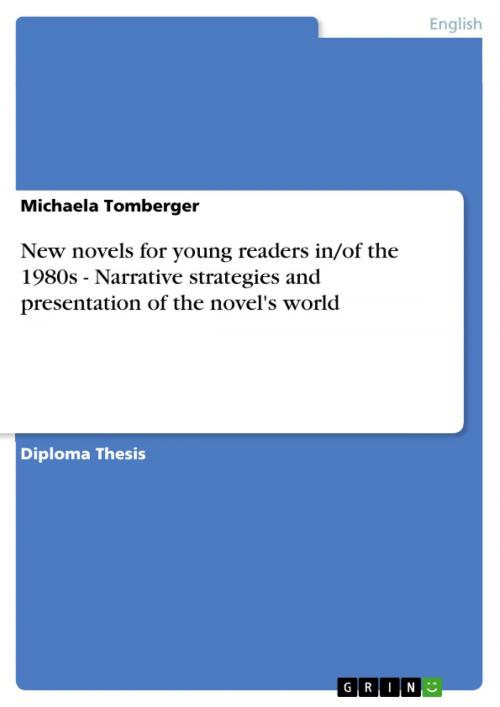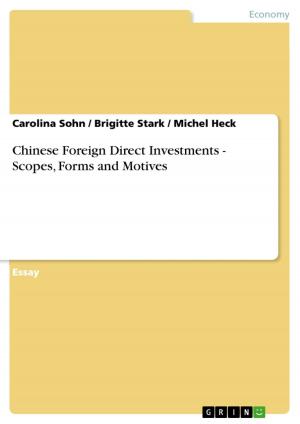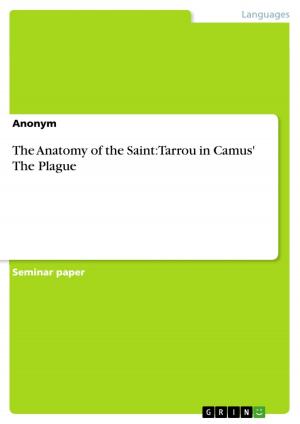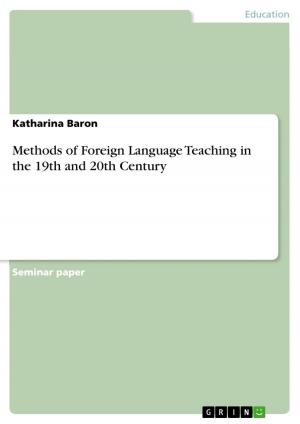New novels for young readers in/of the 1980s - Narrative strategies and presentation of the novel's world
Narrative strategies and presentation of the novel's world
Nonfiction, Entertainment, Drama, Anthologies| Author: | Michaela Tomberger | ISBN: | 9783638108836 |
| Publisher: | GRIN Publishing | Publication: | January 13, 2002 |
| Imprint: | GRIN Publishing | Language: | English |
| Author: | Michaela Tomberger |
| ISBN: | 9783638108836 |
| Publisher: | GRIN Publishing |
| Publication: | January 13, 2002 |
| Imprint: | GRIN Publishing |
| Language: | English |
Diploma Thesis from the year 2001 in the subject American Studies - Literature, grade: Good, University of Vienna (Anglistics-American Studies), 135 entries in the bibliography, language: English, abstract: When during the 1980s short novels like Jay McInerney's 'Bright Lights, Big City' (1984), Bret Easton Ellis' 'Less Than Zero' (1985), Tama Janowitz' 'Slaves of New York' (1986) or Michael Chabon's 'The Mysteries of Pittsburgh' (1988) became talked-about bestsellers in short succession, conservative critics were shocked. Their rejection of these novels was mainly grounded in the discrepancy between the expectations of traditional literary criticism and the new forms of expression these young authors used. The referential matrices of their novels are loaded with signs and codes of their decade; images and fictions spread by mass media have become a fixed part in the world of those novels. Traditional critics considered such references trite and superficial. It cannot be ignored, however, that popular culture found its way into contemporary literature and critics will have to get accustomed to the fact that in contemporary literature the referential horizon, which once was formed by the Bible, classical antiquity and the great works of world literature, is increasingly provided by popular culture as disseminated by the mass media. The fact that these authors were all very young and that they were presented and celebrated like pop stars was, for many critics, proof that pop industry had finally taken over the literary market and that authors would no longer be measured by their achievements as writers but by their celebrity status determined by media-coverage. They felt the end of serious literature was near. On the other hand, there were reviewers, whose praise of those novels and their authors was just as undifferentiated as their denunciations by others. Fashionable terms, from 'MTV novels' to 'yuppie literature', were attached to the novels, and they were glorified as highly accomplished expressions of a changed Zeitgeist'. Despite the great amount of media attention, most of the novels have rarely been closely examined. The two novels 'Bright Lights, Big City' and 'Less Than Zero' will be the focus of this thesis and subject of closer investigation, because they were treated as the representative novels for the whole group. A broad approach to their subject matter will be chosen in order to do justice to the numerous culture-bound implications they contain.
Diploma Thesis from the year 2001 in the subject American Studies - Literature, grade: Good, University of Vienna (Anglistics-American Studies), 135 entries in the bibliography, language: English, abstract: When during the 1980s short novels like Jay McInerney's 'Bright Lights, Big City' (1984), Bret Easton Ellis' 'Less Than Zero' (1985), Tama Janowitz' 'Slaves of New York' (1986) or Michael Chabon's 'The Mysteries of Pittsburgh' (1988) became talked-about bestsellers in short succession, conservative critics were shocked. Their rejection of these novels was mainly grounded in the discrepancy between the expectations of traditional literary criticism and the new forms of expression these young authors used. The referential matrices of their novels are loaded with signs and codes of their decade; images and fictions spread by mass media have become a fixed part in the world of those novels. Traditional critics considered such references trite and superficial. It cannot be ignored, however, that popular culture found its way into contemporary literature and critics will have to get accustomed to the fact that in contemporary literature the referential horizon, which once was formed by the Bible, classical antiquity and the great works of world literature, is increasingly provided by popular culture as disseminated by the mass media. The fact that these authors were all very young and that they were presented and celebrated like pop stars was, for many critics, proof that pop industry had finally taken over the literary market and that authors would no longer be measured by their achievements as writers but by their celebrity status determined by media-coverage. They felt the end of serious literature was near. On the other hand, there were reviewers, whose praise of those novels and their authors was just as undifferentiated as their denunciations by others. Fashionable terms, from 'MTV novels' to 'yuppie literature', were attached to the novels, and they were glorified as highly accomplished expressions of a changed Zeitgeist'. Despite the great amount of media attention, most of the novels have rarely been closely examined. The two novels 'Bright Lights, Big City' and 'Less Than Zero' will be the focus of this thesis and subject of closer investigation, because they were treated as the representative novels for the whole group. A broad approach to their subject matter will be chosen in order to do justice to the numerous culture-bound implications they contain.















